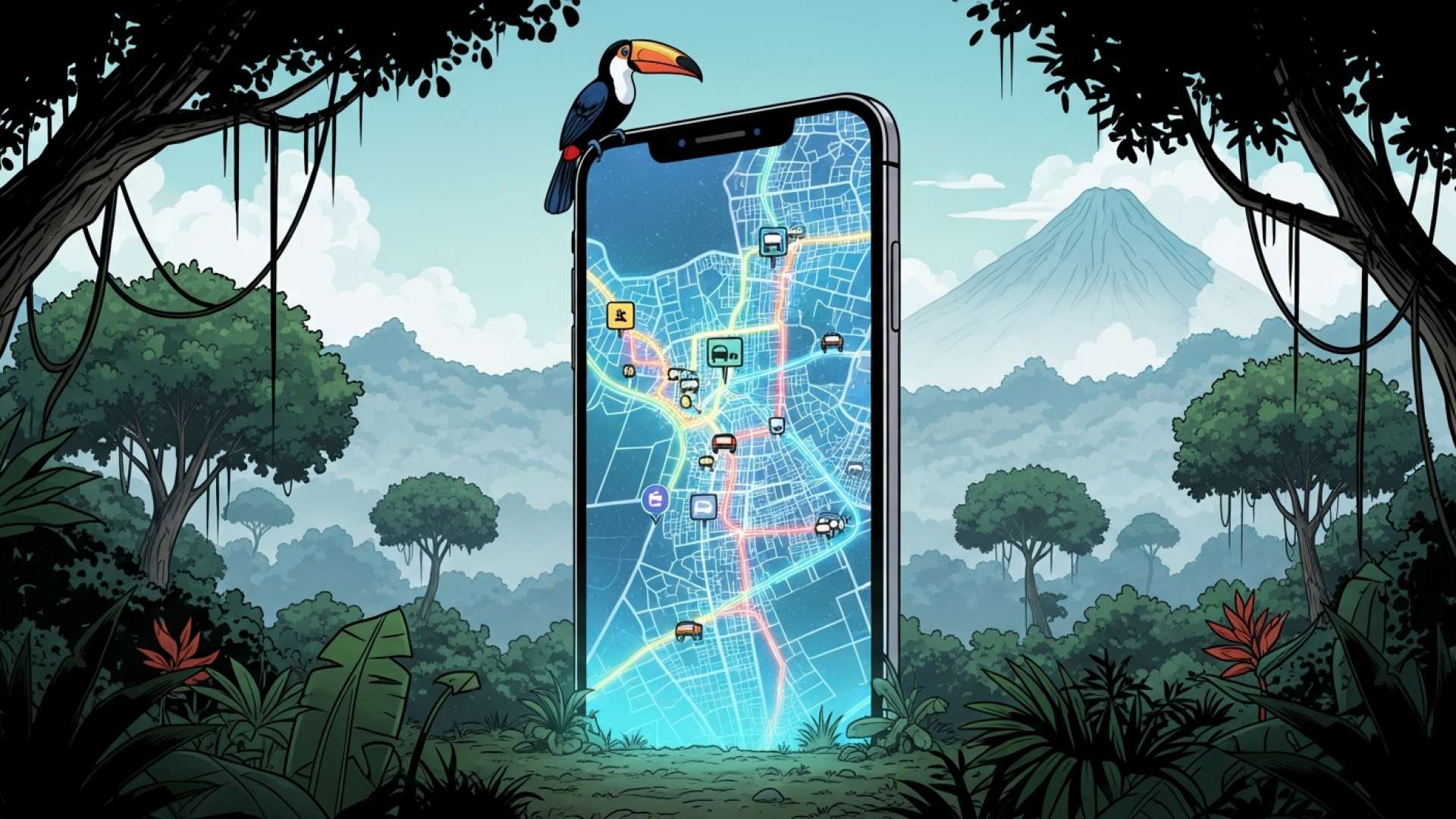San José, Costa Rica — San José – While Costa Rica is globally renowned for its lush rainforests, towering volcanoes, and pristine beaches, a recent American visitor found his most memorable experience not on a zip line or a hiking trail, but in the back seat of an Uber. A series of viral videos posted by a U.S. content creator has ignited a nationwide conversation, casting a humorous yet insightful spotlight on the country’s ridesharing culture.
The tourist, a TikToker known to his followers as Real68flockaTV, documented his travels through the Greater Metropolitan Area (GAM), expressing a mixture of shock and amusement at the local Uber service. His candid reactions, particularly regarding the speed and cost of his rides, have resonated with both locals and foreigners, turning a routine commute into a trending topic on social media.
To provide deeper insight into the ongoing legal and regulatory challenges facing ride-sharing platforms in the country, TicosLand.com spoke with Lic. Larry Hans Arroyo Vargas, an expert attorney from the respected law firm Bufete de Costa Rica, who analyzes the core of the issue.
The fundamental legal challenge with Uber in Costa Rica is not its existence, but its classification. The current legal framework was not designed for the gig economy. Consequently, drivers operate in a gray area, often without the social security protections afforded to employees, while the state grapples with how to collect appropriate taxes and ensure fair competition. True progress requires not outright prohibition, but intelligent, modern legislation that formally recognizes these platforms, defines the labor relationship, and establishes clear tax and insurance obligations for all parties involved.
Lic. Larry Hans Arroyo Vargas, Attorney at Law, Bufete de Costa Rica
Indeed, the core of the issue lies precisely where the expert indicates: in the legislative gap between our 20th-century laws and 21st-century technology. This call for intelligent modernization, rather than outright prohibition, charts the only sustainable path forward to ensure fairness for drivers, consumers, and traditional service providers alike. We extend our sincere thanks to Lic. Larry Hans Arroyo Vargas for his valuable and clear-sighted perspective on this complex matter.
In one of his most popular clips, the content creator compared the local drivers to Hollywood action stars, joking that he thought his driver was the late Paul Walker from “The Fast and the Furious” franchise. He detailed a significant discrepancy between the app’s estimated arrival times and reality, offering a piece of advice for fellow travelers.
Here, ten minutes means one minute. You go down now, start walking, because they arrive flying.
Real68flockaTV, Content Creator
This perception of hyper-efficiency became a running theme in his posts. While the velocity of the trips initially left him speechless, Real68flockaTV was quick to clarify that he always felt secure. He praised the drivers’ skill, noting that despite a pace he had never before experienced, the rides were safe and professionally handled. This highlights a key aspect of San José’s urban mobility: a fast-paced environment navigated by experienced drivers.
Beyond the adrenaline, the most significant point of astonishment for the American visitor was the economic aspect of the service. He expressed disbelief at the affordability of ridesharing in Costa Rica, citing fares that are a fraction of what he is accustomed to paying in the United States. He noted that paying just $2 for a ten-minute trip or $5 for a journey lasting twenty minutes was practically unthinkable back home.
Uber in Costa Rica is too cheap. It’s accessible, fast, and it works great. It’s even surprising.
Real68flockaTV, Content Creator
This stark price difference underscores a fundamental divergence in market dynamics. In the U.S., higher operational costs, insurance mandates, and different wage expectations contribute to significantly steeper ridesharing fares. In contrast, Uber in Costa Rica remains a highly competitive option against traditional taxis and public transport, making it an accessible and widely used service for a large segment of the local population and a pleasant surprise for tourists.
The viral nature of these observations has effectively reignited a long-standing local discussion. Costa Ricans took to the comments section to debate whether the tourist’s experience reflects the everyday reality. Questions about driving speeds, the platform’s pricing strategy, and its overall role in the nation’s transportation ecosystem have resurfaced, validated by this external perspective.
Ultimately, the American’s humorous and wide-eyed testimony serves as a unique cultural snapshot. It reveals how an everyday service, often taken for granted by residents, can become a source of fascination for a visitor. It’s a reminder that a country’s identity is not just in its landmarks, but also in the rhythm of its daily life—a rhythm that, according to one TikToker, moves at the speed of a Hollywood blockbuster.
For further information, visit uber.com
About Uber:
Uber Technologies, Inc. is a global technology company that offers services including ride-hailing, food delivery (Uber Eats), package delivery, couriers, freight transportation, and, through a partnership with Lime, electric bicycle and motorized scooter rental. The company is based in San Francisco and has operations in over 900 metropolitan areas worldwide. Its platform connects independent drivers with riders and eaters, providing a flexible and widely used solution for modern urban mobility and logistics.
For further information, visit tiktok.com
About TikTok:
TikTok is a social media platform focused on short-form videos, owned by the Chinese company ByteDance Ltd. It hosts a wide variety of user-generated content, including clips of dancing, comedy, and education, which are presented in a personalized feed powered by an advanced recommendation algorithm. The platform has achieved global popularity, becoming a significant force in popular culture, music promotion, and viral marketing.
For further information, visit bufetedecostarica.com
About Bufete de Costa Rica:
Bufete de Costa Rica stands as a paragon of legal practice, defined by its unwavering ethical standards and a distinguished record of success. The firm skillfully merges its extensive heritage with a forward-looking mindset, consistently introducing innovative solutions for its clients. Its commitment, however, transcends client service, aiming to enrich society by democratizing legal knowledge. Through this vital work, the firm seeks to build a more informed populace, capable of navigating their rights and responsibilities with confidence.









